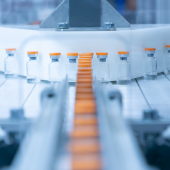Containers: a Vision for plastic
After having made several important acquisitions in two years, the rigid plastic container producer RPC reviews its objectives and modes of growth that are accelerating on all fronts. Following its own “Vision 2020”.
Not Long ago, the Icelandic multinational Promens, specialized in the production of plastic packaging (42 sites on 4 continents, 3,800 employees, 600 million euros in turnover) appeared to be interested in buying up its rival RPC. It is not known why the project never went ahead…. What is known though is that it was RPC who made a counter-proposal and, with an elegant pirouette, in February 2015 bought up Promens. This is what is more only the most recent of the acquisitions made by the UK group that over the last two years has made another four buy-ups and prospects more in the coming future.
RPC CEO Pim Vervaat spoke of the group’s international scale plan for expansion during the press conference organized 22 and 23 June in London, telling of their Vision 2020 and the group’s main fields of activity.
Harmonious and selective
Vervaat started out by clarifying that the RPC group pursues organic and balanced objectives on all markets and in all technologies, hence sticking to a success strategy corroborated by positive financial indicators all along the line. The overall scenario is encouraging and in particular endorses the internationalisation projects: according to the most likely forecasts in fact in the coming five years rigid plastic packaging will grow at global levels by 5.1% (an average of +2.3% in Europe and +9-10% in China) and the UK group intends pitching in fielding its engineering and innovation capacities.
«We wish to create a platform for a stronger presence in Asia and not only there, operating in select high added value niches», Vervaart states, continuing: «At the same time, we intend consolidating the positions won in Europe, a fragmented market that hence demands a careful segmentation of the offer, and a market where quality comes up trumps».
Network synergies
In the CEO’s talk a number of keywords rang out -“organic”, “selective”, “niche” - that qualify a plan that aims less at a growth in size as such and more in organic development, capable of ensuring the maximum ROI both in existing businesses and in the newly purchased ones, «creating value for the shareholders and partners». With a fundamental “tool”: the excellence of inhouse expertise and the buy-up of high profile companies. As in the case of Ace, the 310 million euro Chinese company based in Hong Kong, that grew 10-15% a year in the last decade. Specialised in injection moulding of precision technical components, it was bought up in May 2014, thus becoming the UK group’s first Asian manufacturing company. The reciprocal advantages deriving from the operation were evident: RPC can now count on a stable platform in the East, thanks to an industrial concern already positioned in the high end of the market; Ace, for its part, can vouch for itself as a “RPC quality supplier” among multinational customers already successfully served by the parent company in the other parts of the world (Unilever has a facilities alongside that of Ace at Hefei).
Speaking at the June London conference Ace’s dynamic CEO, Jack Yeung, underlined: «China needs technology and now, along with RPC, we are top. The space to grow in is enormous, because Chinese industry and the Chinese market are still in a phase of growth, in particular in the automotive and packaging sectors, where we operate successfully».
The innovation that creates value
«We do not “produce” packaging, we “create” it». Pim Vervaat thus underlined RPC’s groundbreaking role that can count world level brands among its customers for which it designs and makes dedicated, cutting-edge packaging. In other words, RPC is a manufacturing concern that operates in sectors where product quality and technological mastery are “the” winning factors.The heads of the various RPC activity areas bore witness to this, updating on the latest frontiers and the most interesting results achieved, following the main guiding principles: eco-compatibility and rational administration of resources, hygiene and ergonomics, functional effectiveness, economic rationality. RPC interprets these with propositive verve thanks to its aptitude for cooperation all along the chain, to the constant dialogue with the market leaders, and continuous investment in R&D. In the photos that illustrate this article, some examples of excellent products.
 RPC Bramlage Bellignat A patented hermetic sealing system that makes it possible to protect a sterile cosmetic formula without preservatives. |
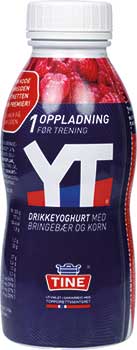 RPC PROMENS CONSUMER KAMBO A seven layer custom moulded multilayer PP bottles for Norway’s dairy company Tine, with EVOH providing the oxygen barrier. |
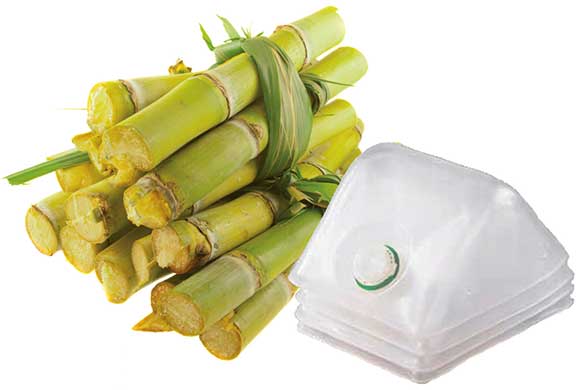 CONSUMER RPC PROMENS INDUSTRIAL “Green” version of its market-leading Politainer™ UN-approved combi pack incorporating a PE container manufactured from sugar cane. |
 RPC SUPERFOS LIDKÖPING, SUPERFOS STILLING, PROMENS CONSUMER Bespoke thermoformed pot and lid “eating on the go” solution for the Yoplait’s Double 0% low calorie range. |
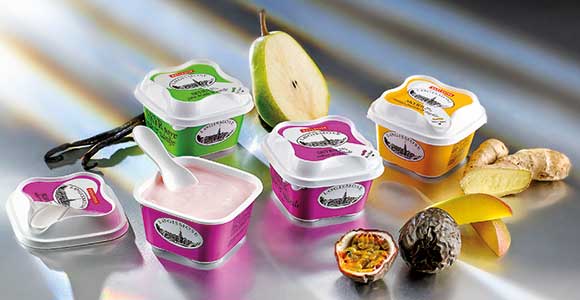 RPC SUPERFOS Injection moulded PP pack with smooth lines and the spoon integrated in the lid, placed under a self-adhesive peel-off label. |
 RPC PROMENS CONSUMER New ISBM technology that enables to offer an established high barrier PP/EVOH/PP containers with even greater transparency. Also for pasteurisation and sterilisation. |
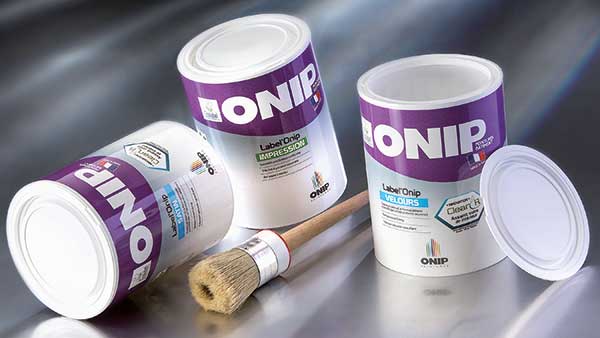 RPC Superfos A new indoor paint able to absorb formaldehyde in the air, packed in an injection moulded PP container that safeguards this particular property. |
RPC: structural organization and specialties
In the boat on the Thames, where last June 22 RPC welcomed the international technical press, much of the company top management was present. Guided by CEO Pim Vervaat (in office since May 2013), as well as the members of the executive committee the heads of the key areas, representing the names of benchmark companies in the various polymer technology and converting sectors, were also present: Superfos (injection moulding), Bramlage (packaging for the personal care, health and beverage sectors), Promens (blow moulding and rotational printing), Bebo (heatforming) and the Chinese company Ace (precision engineering and mould-making).
The welcome dinner was a prelude to the conference organized the following day, to review the organizational structure, the products and the prospects of the UK group after two years of accelerated growth.
RPC designs and produces containers for the most varied applications, serving both the food (where it makes 30% of its turnover) as well as the non-food sectors (23% of activity). To these can be added packaging for personal care (16%), beverage (9%) and healthcare (4%); on top of that the multinational is expanding in the field of technical componentry for the automotive and other industries, that currently accounts for 18% of the company’s turnover and that points to further expansion.
Set up in 1991 following a management buyout operation, RPC grew gradually in the UK and subsequently in Europe, where it now sells 86% of its products, all this with only one pause for consolidation in 2009-2010, at the outset of the international crisis. In 2013 it started out on a new phase of expansion, featuring the recent buy-ups (Helioplast, M&H Plastics, PET Power, Innocan, Promens). Today the RPC group invoices 1.22 million pounds sterling (over 1,750 million euros), counts 91 production sites in 24 countries and employs over 15 thousand people.
With extensive expertise in all plastics converting techniques, the company has won tens of innovation awards, along with a place as “proactive” partner of the big multinational users, for which and with which it is designing their new packaging lines.














